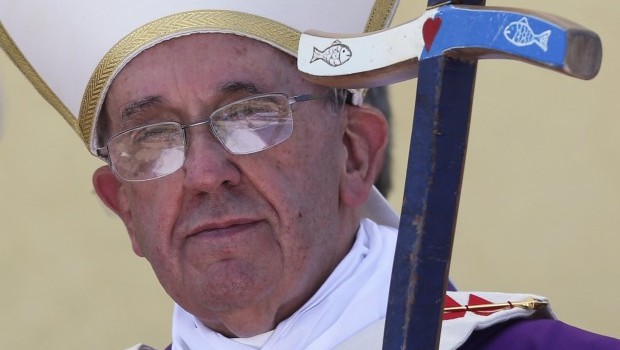Lampedusa, AP—Pope Francis on Monday denounced the “globalization of indifference” that greets migrants who risk their lives trying to reach Europe, as he traveled to the farthest reaches of Italy to draw attention to their plight and to mourn those who never made it.
The tiny Sicilian island of Lampedusa, a treeless, strip of rock four miles long, is closer to Africa than the Italian mainland and is the main port of entry into Europe for African migrants smuggled by boat from Libya or Tunisia.
Francis decided last week to make Lampedusa his first pastoral trip outside of Rome, compelled by a particularly deadly crossing in which a dozen migrants lost their lives. Despite the spur-of-the-moment decision, the island came through, building a makeshift lectern, pastoral staff and chalice out of recycled wood from shipwrecked migrant boats.
Francis greeted newly arrived Africans and during an open-air Mass on the island’s soccer field, thanked the residents for welcoming so many men and women over the years.
But the core reason for the visit, he said, was to mourn those who died trying to make a better life for themselves and their families. He tossed a wreath of flowers into the sea in their memory, calling their deaths a “thorn in the heart” that occurs so often it is simply ignored.
“Who wept for these people who were aboard the boat?” Francis asked in his homily. “For the young mothers who brought their babies? For these men who wanted to support their families?”
“We are a society that has forgotten how to cry,” he said.
Dozens of fishing boats accompanied Francis’ coast guard ship as it pulled into port, a seaborne motorcade to honor the first pope to visit an island that often feels it has been abandoned by Europe to process the thousands of would-be immigrants who come ashore each year.
“Pope Francis, only you can save us,” read a banner on one of the boats. “Welcome among the least,” said a poster with an Argentine and Italian flag dangling from an apartment building.
As his plane was landing, a boat carrying some 160 Eritreans arrived in port, the latest in a new wave of migrants taking advantage of calm seas and warm weather to make the treacherous crossing. Officials said they were in good condition, just cold.
Francis, whose ancestors immigrated to Argentina from Italy, has a special place in his heart for refugees: As archbishop of Buenos Aires, he denounced the exploitation of migrants as “slavery” and said those who did nothing to help them were complicit by their silence.
He repeated that message on Monday, railing against smugglers who take advantage of the poverty of migrants to enrich themselves. He challenged everyone to take responsibility for the migrants’ desperation, urging them not to have “anesthesia of the heart.”
“The culture of our own well-being makes us insensitive to the cries of others,” he said. “It brings us to feeling indifferent to others, to the globalization of indifference.”
Then directing himself to the Muslims on the island, he said: “The church is with you in the search for a more dignified life for you and your families.”
Francis has said he wants his to be a missionary church, one that goes to the “peripheries” to minister to the most marginal.
It was appropriate then that he choose faraway Lampedusa as his first pastoral visit, and its residents welcomed him warmly, shouting “Viva il Papa” as he drove by in an open-topped Fiat—not the usual bullet-proof popemobile—and wildly waving the yellow and white flags of the Vatican.
The Vatican said 10,000 people attended the Mass, twice the island’s population. National politicians weren’t among them, to avoid the inevitable squabbling over illegal immigration that is a mainstay of Italian politics.
“It was not even thinkable that the pope would come to an Island like this one,” said resident Andrea Pavia, who came out with his tearful wife and daughter to watch the pope drive by. “I am so happy, I am so emotional. I just can’t believe it.”
The Mass site was located on a soccer field that in 2011 housed thousands of migrants who flooded to Italy during the Arab Spring. It’s near the “boat cemetery” that holds the remains of broken migrant ships that have reached Lampedusa’s rocky shores.
Recycled wood from those vessels were used for Mass: A small, painted boat was turned into the altar, the lectern was made out of a recycled ship’s helm and pieces of driftwood, and a pieces of wood were crafted into Francis’ pastoral staff and the chalice used at Mass. Officials have said the simple nature of the Mass was in keeping with the express wishes of Francis.
According to the UN refugee agency, 8,400 migrants landed in Italy and Malta in the first six months of the year, almost double the 4,500 who arrived during the first half of 2012. It’s still a far cry from the tens of thousands who flooded to Italy during the Arab Spring exodus of 2011.
The UN High Commissioner for Refugees has recorded 40 deaths in the first half of 2013, and a total of 500 for all of 2012. Fortress Europe, an Italian observatory that tracks migrant deaths reported by the media, says about 6,450 people died in the Canal of Sicily between 1994 and 2012.
Mauro Casinghini, who heads the Italian emergency response arm of the Knights of Malta, said there has been an increase in pregnant women making the crossing, hoping their babies might obtain Italian citizenship if born here.
“I have dealt with cases where we are trying to help a woman in the first stages of delivery on a sinking boat with water floating in gas, urine and human feces,” he said Monday. “That is not a good place for a child to be born.”

